
The Coral Conservation in the UK Overseas Territories (C-COT) working group brings together coral practitioners in the Caribbean and Western Atlantic UK OTs and plays an important role in safeguarding coral reef ecosystems within some of the world's most biologically diverse marine environments. These ecosystems are vital not only for marine biodiversity but also for the economic and social well-being of local communities.
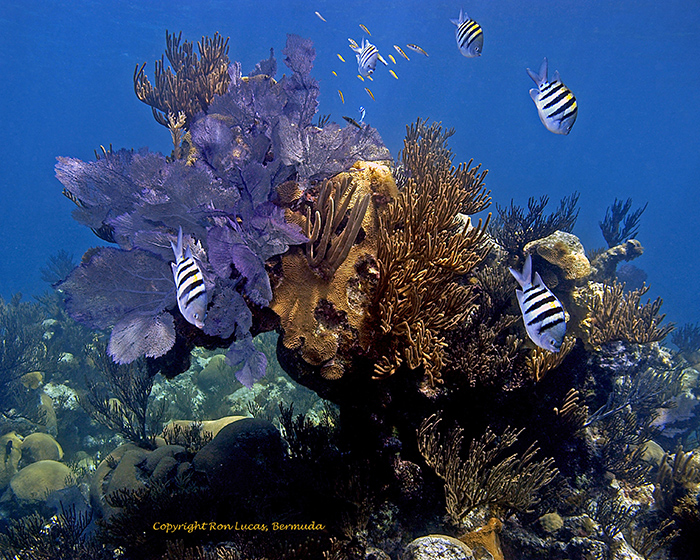
A reef scene in Bermuda ©Ron Lucas
In response to increasing global environmental challenges, C-COT acts as a hub for collaboration, focusing on leveraging scientific advancements to address the impacts of threats to coral reefs, such as climate change, overfishing and coral diseases such as Stony Coral Tissue Loss Disease (SCTLD). This adaptive approach aims to contribute to the preservation of these critical ecosystems for future generations.
Why Coral Conservation Matters
Coral reefs are more than just beautiful underwater landscapes; they are fundamental to the health and prosperity of coastal communities. Across the UKOTs, coral reefs offer natural storm defences, protect shorelines, support the livelihoods of fishing communities, and are pivotal to the booming tourism industry, which contributes billions to the regional economy. In fact, it is estimated that coral reefs contribute upwards of USD $3.4 billion annually to the Caribbean economy.
Yet, these ecosystems face unprecedented threats. Over the last 30 years, Caribbean coral cover has diminished by up to 80%, largely due to climate change, pollution, unsustainable fishing practices, and the rapid spread of coral diseases like SCTLD. The disease, which emerged in Florida in 2014 and was first reported in the UKOTs in 2019, has already decimated coral populations and continues to pose an existential risk to these fragile habitats. One of the main priorities for the C-COT group has been ensuring that marine practitioners are well-equipped to respond to these emerging threats, with access to resources, shared experiences, and adaptable strategies to protect reefs in a rapidly changing world.
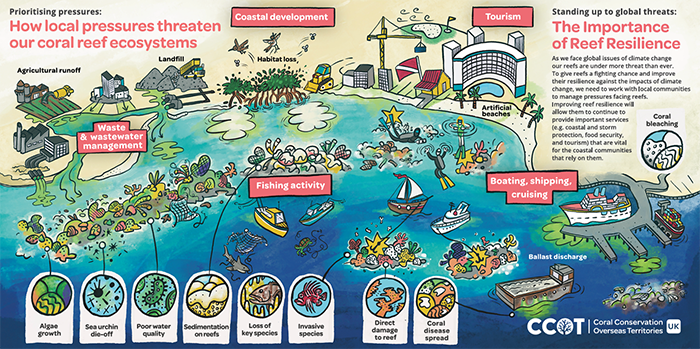
This image features an infographic developed by Deviate Design in Bonaire on behalf of the C-COT group. While it does not provide a comprehensive overview of all threats facing reefs, this graphic offers an initial perspective on some of the primary local pressures threatening coral reef ecosystems in the Caribbean and Western Atlantic UKOTs. The image highlights the importance of reef resilience and emphasises the message that, to enhance the chances of success against emerging global threats, local-level challenges must also be addressed.
Infographic featuring various pressures threatening coral reefs ©JNCC
About C-COT
The main benefit of C-COT is that it has been able to establish a collaborative platform that centres around resource sharing, shared experiences, links with regional experts and universities - all to help improve capacity constraints in the OTs and ensure OT marine practitioners are better prepared and supported in addressing SCTLD and other marine threats on their reefs. This collaborative group brings together government departments, non-governmental organisations (NGOs), and academic institutions from the six Caribbean Western Atlantic UK Overseas Territories (OTs):
- Anguilla
- Bermuda
- The British Virgin Islands
- The Cayman Islands
- Montserrat
- The Turks and Caicos Islands

Crests of OTs with the Darwin and UKaid Logos
The C-COT partnership fosters cross-OT and regional collaboration with countries in the Caribbean, creating opportunities for: Learning exchanges, project funding, university connections, external workshops
By providing working group members with access to the best available science, management strategies, and shared approaches, C-COT aims to address both current and future coral disease outbreaks affecting their reefs.
The C-COT group thanks the UK Government (Defra) for supporting funding to ensure the group can continue operating for the 2024/2025 financial year.
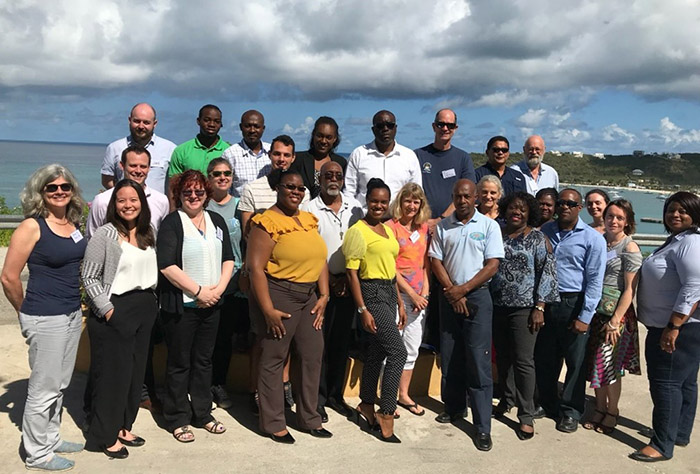
Group photo of the C-COT stakeholders ©JNCC
Adaptive Management Cycle
Coral reef ecosystems are highly dynamic, and effective management requires a flexible, iterative approach. The Adaptive Management Cycle utilised by C-COT is central to our response to SCTLD and other coral-related threats. This cycle consists of five stages:
- Development of SCTLD Treatment Strategies: Drawing on the latest scientific research, reef-specific treatment protocols can be devised to address the unique needs related to SCTLD defence.
- Implementation of Treatments: Treatment protocols are put into practice in real-world reef settings, with special care taken to minimise ecological disruption.
- Monitoring Effectiveness: Continuous monitoring of treated reefs to assess the effectiveness of interventions and adjust strategies as needed.
- Evaluation of Outcomes: Rigorous evaluation of treatment success, based on factors such as disease spread, coral survival, and overall reef health.
- Revision of Management Strategies: Based on the findings, management strategies can be revised and enhanced to ensure ongoing improvements in coral health and resilience.
This adaptive approach allows us to remain responsive to the ever-changing nature of coral ecosystems, ensuring that our interventions are as effective as possible in the face of both known and emerging threats.
Projects and Research
DPLUS147: Collaborative Approach to Coral Disease
The DPLUS147 project formed the foundation of C-COT’s efforts in managing SCTLD. Funded by Darwin Plus, this initiative ran from 2021 to 2024 and successfully fostered collaboration across the UK Overseas Territories, allowing for the sharing of resources, knowledge, and scientific expertise. By partnering with leading coral disease experts, including Dr. Greta Aeby, Dr Blake Ushijima, and utilising regional resources and research, we have been able to trial innovative, region-specific treatment strategies to identify the most effective interventions for specific UKOT reefs and provide recommendations to the wider public.
Although the project has now concluded, the C-COT group has expressed a strong desire to continue its efforts in addressing coral health challenges and implementing effective management strategies for the future. Through this project, C-COT has made significant strides in mitigating the impact of SCTLD, with treatments proving effective in halting disease progression in many cases. The group remains committed to refining these methods as new research becomes available.
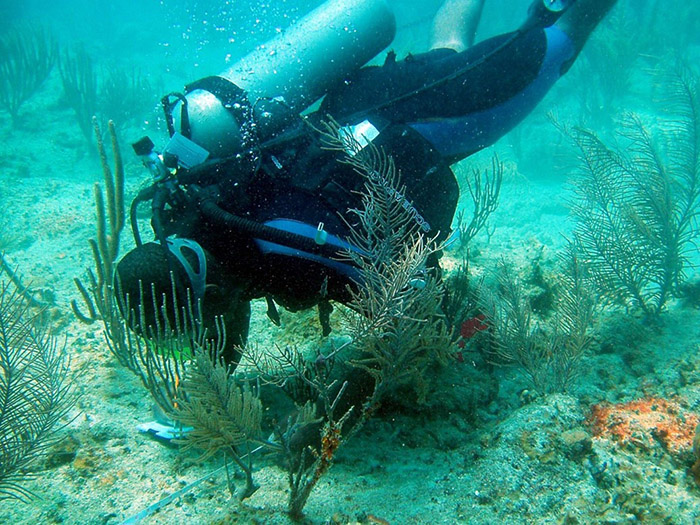
Diver surveying reef ©JNCC
Tackling Stony Coral Tissue Loss Disease (SCTLD)
Stony Coral Tissue Loss Disease (SCTLD) represents one of the greatest biological crises facing coral reefs today. First identified off the coast of Florida in 2014, SCTLD has rapidly spread throughout the Caribbean, infecting over 30 species of stony corals across more than 32 countries and territories (Collaborative Stony Coral Tissue Loss Disease (SCTLD) Treatment and Management Strategy 2023/2024). In the UK Overseas Territories, SCTLD poses a severe threat to biodiversity, as it affects some of the region's most structurally important coral species, including brain corals, pillar corals, and star corals.
The nature of SCTLD is particularly troubling due to its high mortality rate and the speed at which it spreads. Within weeks, the disease can devastate entire coral colonies, resulting in large-scale coral die-offs. Moreover, SCTLD is waterborne, spreading through natural ocean currents, and can be exacerbated by human activities such as shipping, ballast water discharge, and coastal development.
In order to improve preparedness to SCTLD defence, the C-COT group has developed an evidence-based treatment and management strategy, acting as a potential tool for marine practitioners in the region. This strategy involves a multi-pronged approach:
- Early Detection and Monitoring: Regular monitoring of coral health to identify outbreaks at the earliest possible stage.
- Treatment Trials: Experimental use of treatments such as amoxicillin-based ointments, probiotics, and chlorinated epoxy, tailored to specific coral species.
- Public and Community Engagement: Engaging local communities, divers, and fishers in biosecurity measures to prevent further spread of the disease.
Adaptive Management: A framework that allows for continual reassessment of treatments based on real-time data and emerging scientific knowledge.
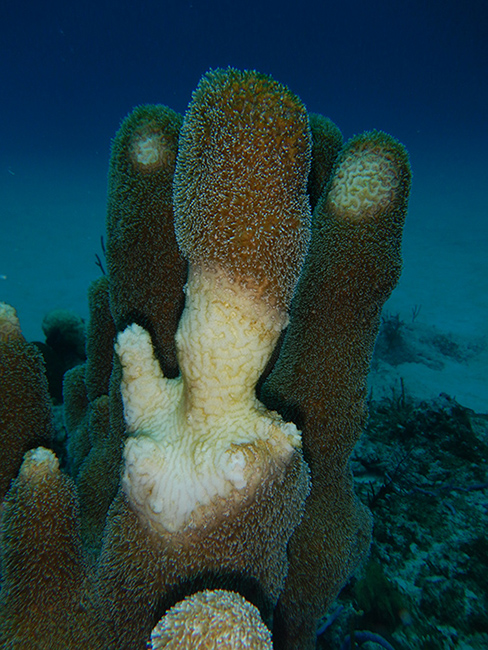
Pillar coral showing signs of SCTLD damage in the Turks and Caicos Islands ©az-tcrf
Reports and Resources
To support evidence-based decision-making, C-COT has produced a range of publicly accessible scientific resources. These reports offer valuable insights into coral reef health, disease management, adaptation to changing environments, and future goals for the C-COT group, while also compiling essential resources on SCTLD research and treatment strategies across the region.
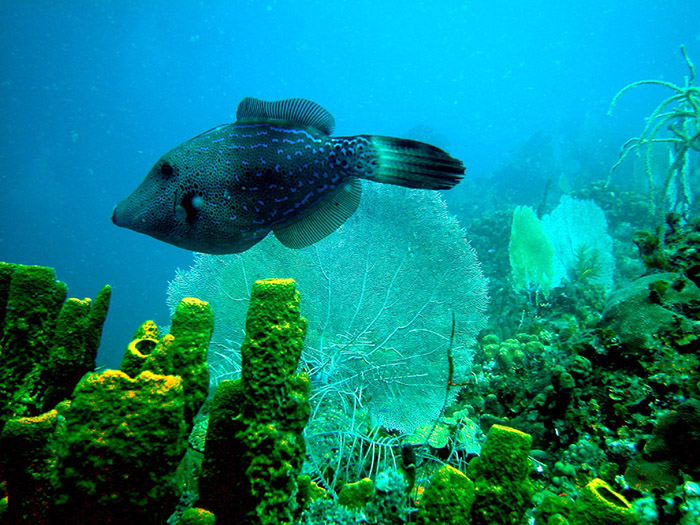
Scrawled Filefish in the British Virgin Islands ©BVI National Trust
Published: .
